Whether you’re about to graduate from high school and head off to college or you’re an adult going back to school, online colleges in Oklahoma can potentially offer you the flexibility to earn your degree on your own schedule.

The state is fiercely committed to higher education and helping residents earn their degrees. Through the Complete College America (CCA) initiative, Oklahoma’s graduation rates have increased by more than 11% over the last 10 years.
Editorial Listing ShortCode:
To do this, the state has focused on college readiness, transforming remediation, strengthening pathways to certificates and degrees, expanding adult degree completion efforts, and rewarding performance and completion. So far, the state has made significant progress and surpassed benchmark goals.
Online Colleges in Oklahoma

According to data from the National Center for Education Statistics (NCES), a little over 21% of higher education students in Oklahoma are enrolled in fully online college degree programs. Almost another 30% are enrolled in hybrid programs, combining both online and on-campus courses.
The numbers continue to rise as colleges increase their online learning opportunities. Various schools across Oklahoma offer a variety of degree programs in hybrid and online formats, including bachelor’s degree programs, several online graduate degree programs, and many certificates and training courses.
Editorial Listing ShortCode:
Several private universities also offer online associate and bachelor’s degrees in fields like liberal arts, computer science, nursing, and business. Some also offer online MBA programs.
These programs can potentially allow you to complete your degree entirely online without ever stepping foot on campus.
Common Online Degrees in Oklahoma

There is a wide variety of Oklahoma online degree programs available. Though the options available vary from school to school, these are some of the most popular degrees in the state and what they typically entail:
- Finance: During a finance degree program, you can learn about economics, banking, and accounting. This degree can help you pursue a career as a financial manager, accountant, or investor.
- Nursing: Nurses provide care for patients in hospitals, clinics, and other healthcare facilities. A nursing degree program can help prepare you for a career as a vocational or registered nurse.
- Criminal Justice: Common topics of study in a criminal justice program are law enforcement, court systems, and legal processes. Earning a degree in this field can help you pursue a career as a police officer, a lawyer, or a detective.
- Business Administration: A business administration program can help you develop the leadership skills that are necessary to manage and oversee an organization. Common topics of study include human resources, budgeting, and contract law.
- Psychology: The curriculum of a psychology program typically involves studying human behavior and mental health disorders. It can help you develop a strong foundation for a career as a psychologist, a counselor, or a therapist.
Before selecting a degree program, it can be useful to think about your passions, interests, and goals and how your academic pursuits will best align with them.
Overview of Higher Education in Oklahoma

In Oklahoma, there are 46 degree-granting institutions, according to the NCES. Of those, 30 are public schools, 13 are non-profit schools, and 3 are for-profit schools. This also includes community colleges in Oklahoma.
To attend one of the state’s 4 year public universities, according to the NCES, in-state students pay, on average, $8,064 in tuition and fees each year, while out-of-state students pay around $31,737. Both totals are well below the national average.
Residents who cannot find the program they’re looking for at in-state schools can also look to neighboring states.
Oklahoma’s membership in the Southern Regional Education Board (SREB) allows qualifying residents to enroll in programs at schools in any of the 16 participating states and pay in-state tuition rates.
Employment Outlook for College Graduates in Oklahoma

The state of Oklahoma has a relatively stable employment outlook for those who earn Oklahoma online degrees. Data from the Bureau of Labor Statistics shows that there are more than 1.6 million people in the Oklahoma workforce.
Among the state’s most prominent industries are office and administrative support, food preparation, and sales. Many of these positions don’t require college degrees, but higher education may open doors to new opportunities for advancement and better salaries.
College graduates seeking employment in Oklahoma may also find work in growing industries such as healthcare, education, and business and financial operations. According to the Bureau of Labor Statistics, unemployment rates in Oklahoma hover around 3%, which is slightly lower than the national rate of 3.7%.
The median annual salary for all occupations in Oklahoma is $39,100. This is lower than the national median salary of $46,300 per year.
Careers & Salaries in Oklahoma
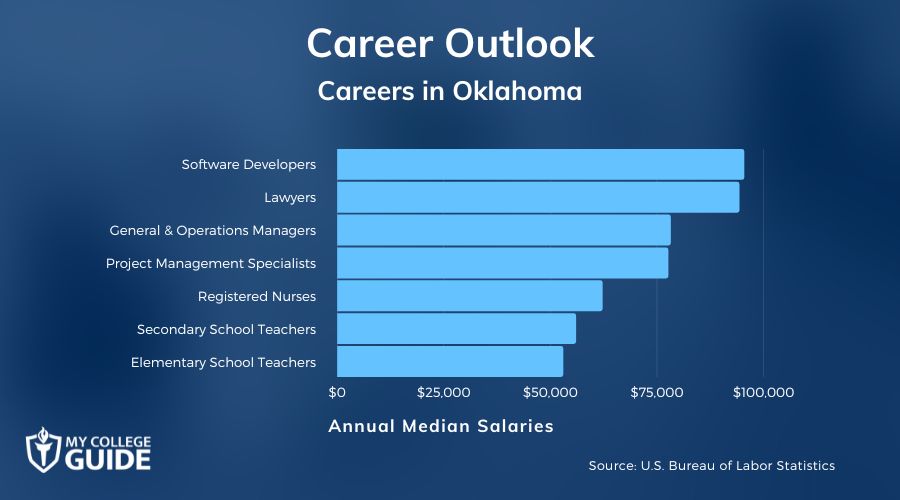
Earning a college degree in Oklahoma may help you qualify for a range of positions with competitive salaries and opportunities for growth. Management, business, education, and healthcare are all potential avenues for employment in the state.
According to the Bureau of Labor Statistics, these are some of the most common career paths for college graduates in Oklahoma.
| Careers | Annual Median Salaries |
| Lawyers | $99,990 |
| Medical and Health Services Managers | $95,580 |
| Software Developers | $99,510 |
| Project Management Specialists | $81,200 |
| General and Operations Managers | $77,480 |
| Registered Nurses | $74,530 |
| Accountants and Auditors | $73,200 |
| Market Research Analysts and Marketing Specialists | $55,160 |
| Human Resources Specialists | $49,630 |
| Computer User Support Specialists | $49,570 |
In addition to strengthening your resume when applying for jobs, a degree may also give you the ability to take on higher-level positions with stronger pay and increased responsibilities.
Editorial Listing ShortCode:
Your specific job availability and salary potential will depend on a number of factors, including your location, employer, work experience, and education
Oklahoma Colleges Online Admissions Requirements

When applying to online Oklahoma colleges, you will likely have to meet very specific requirements. While requirements vary from school to school, some of the most common criteria include:
- Test scores: Some schools require the submission of scores from tests like the SAT or ACT.
- Transcripts: You’ll typically need to submit official transcripts from high school and any previous academic institutions that you’ve attended.
- Personal essay: You may need to write a brief essay explaining why you’re interested in the degree program.
- Recommendations: Schools typically ask for letters of recommendation from previous instructors describing your strengths and abilities.
You will likely have to submit an official application as well and may have to pay an application fee.
OK Online Colleges Accreditation
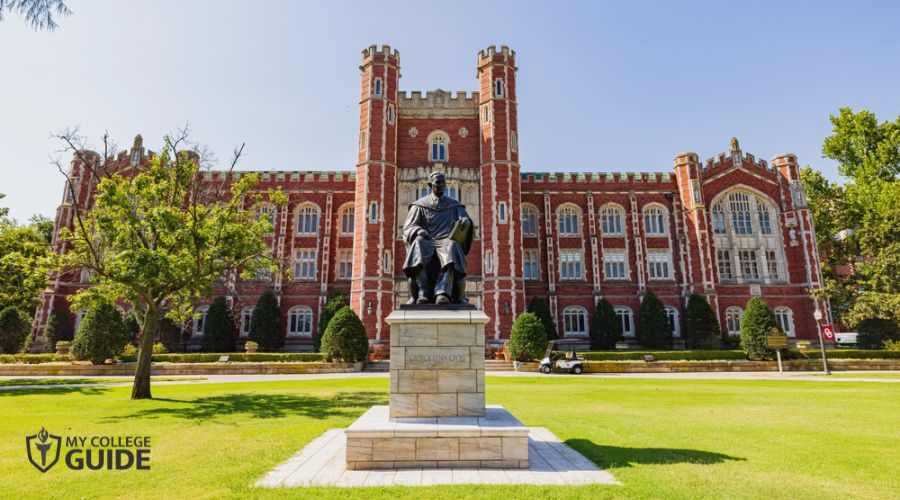
Accreditation is one of the most important aspects of a potential college. Schools can earn regional accreditation by undergoing a thorough evaluation and assessment process.
Regional accreditation is generally regarded as the gold standard because the requirements for academic programs are so high. Attending a regionally accredited program can help ensure that you’ll receive a quality education with the most up-to-date information.
Editorial Listing ShortCode:
It’s also typically easier to transfer credits from a regionally accredited program if you change colleges or decide to pursue an advanced degree. Many employers look more favorably on degrees from programs with regional accreditation as well.
Financial Aid and Scholarships
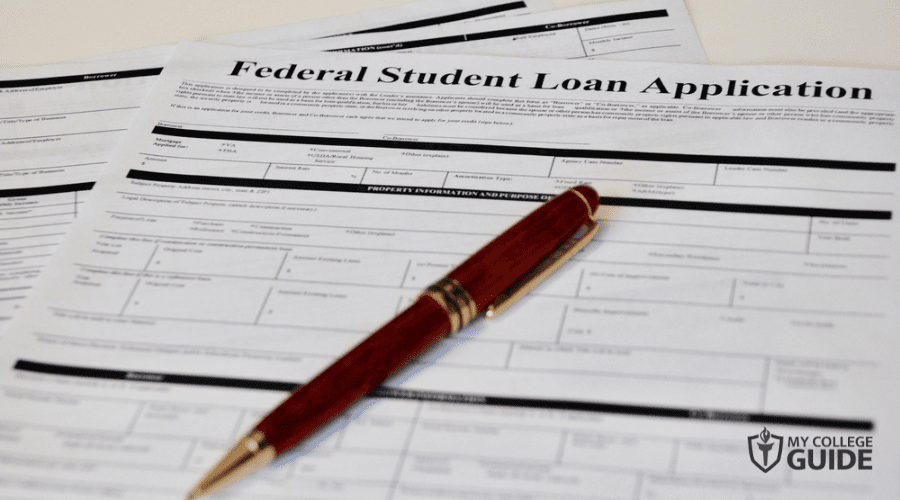
In order to access federal, state, and even some private financial aid in Oklahoma, you’ll need to fill out the Free Application for Federal Student Aid (FAFSA). The information you provide on this application will determine the types and amount of aid you can receive.
The state of Oklahoma provides a number of grant and scholarship programs to help supplement federal aid for its residents looking to attend Oklahoma online universities. Here are some of the programs Oklahoma residents can apply for:
- Oklahoma Tuition Aid Grant (OTAG): This is a need-based aid program available for eligible schools.
- Oklahoma Tuition Equalization Grant (OTEG): This is a need-based grant. It requires attendance at an eligible school and a family income of $50,000 or less.
- Academic Scholars Program: This program requires designation as a National Merit Scholar, a National Merit Finalist, or a US Presidential Scholar, or a score in the 99.5 percentile on the ACT or SAT.
- Regional University Baccalaureate Scholarship: This scholarship requires attendance at one of 11 participating universities and an ACT score of 30 or higher, National Merit Semifinalist designation, or Commended Student designation.
The state also provides financial assistance to qualifying students pursuing specific career paths:
- Future Teachers Scholarship: This scholarship requires a GPA of 2.5 or higher and an agreement to teach in a shortage area in Oklahoma public schools for at least 3 years upon graduation.
- Teacher Shortage Employment Incentive Program (TSEIP): This is a loan reimbursement program for students who plan to teach math or science in Oklahoma.
- George and Donna Nigh Public Service Scholarship: This is for those enrolled in a degree program leading to a career in public service and requires continued exceptional academic achievement.
Additional aid is available for children of military personnel who were killed in action, those who are in the National Guard, and those who have been or are in the state’s foster care system. Oklahomans can also apply for private scholarships, such as these:
- 3 Point Scholarship: Varies
- Farmers Mutual Hail Insurance Company of Iowa Scholarship: Up to $1,500
- Innovation in Education Scholarship: $500
- The Jimmie L. Dean Foundation Scholarship: Up to $10,000
Individual colleges and universities offer need and merit-based assistance too. To find out more about these programs, you can contact the financial aid office at the school of your choice.
Oklahoma Online Education Resources

Applying for a degree program can be complicated, and these resources provide valuable information:
- Oklahoma State Regents for Higher Education: This organization offers guidance on financial aid and different college programs.
- Reach Higher: Reach Higher assists students who want to complete unfinished degrees with flexible degree programs and financial aid.
- Oklahoma Department of Education: The Department of Education’s higher ed office includes a comprehensive list of private and public colleges within the state.
These sites can be especially helpful if you encounter questions about issues like accreditation, financial aid, and the application process while applying to online colleges in Oklahoma.
How Much Does It Cost to Go to an Oklahoma Online University?

The cost of online education in Oklahoma differs based on your residency and enrollment status, as well as the school you attend.
Attending an Oklahoma community college is likely the most affordable option, while private schools are usually more expensive.
In-state students in Oklahoma typically pay substantially less than out-of-state students. For instance, an in-state student might pay around $8,000 in tuition at a public college, while a non-resident may pay more than $21,000 for the same school.
Editorial Listing ShortCode:
In many cases, completing a degree online costs less than attending on campus because students can save money on fees, parking, and transportation.
Tuition Breaks for Out-of-State Students

Although completing an online degree in Oklahoma is often more expensive for out-of-state students, there are opportunities for tuition discounts and lower rates. Oklahoma is a member of the Southern Regional Education Board, which has a tuition reduction program.
Participating colleges and universities in Oklahoma allow qualifying non-resident students from certain states to attend programs at the in-state rate.
Other member states in the Southern Regional Education Board are Texas, Louisiana, Arkansas, Alabama, Delaware, Tennessee, Virginia, Mississippi, Kentucky, Georgia, Florida, South Carolina, West Virginia, and Maryland.
Some online universities in Oklahoma have opted to offer a flat tuition rate for students regardless of where they live. They may require students to pay an additional fee for participating in virtual classes.
What Jobs Are in Demand in Oklahoma?

One of the deciding factors when choosing a degree program is planning for a career that’s in demand so that you can find a position soon after graduating. According to the Oklahoma Employment Security Commission, these are some of the most in-demand jobs in the state:
- Registered nurses
- Medical and health services managers
- Market research analysts and marketing specialists
- Financial managers
- Substance abuse, behavioral disorder, and mental health counselors
Pursuing a degree in nursing, business administration, finance, or psychology often serves as excellent preparation for these sought-after professions.
What Are the Highest Paying Jobs in Oklahoma?
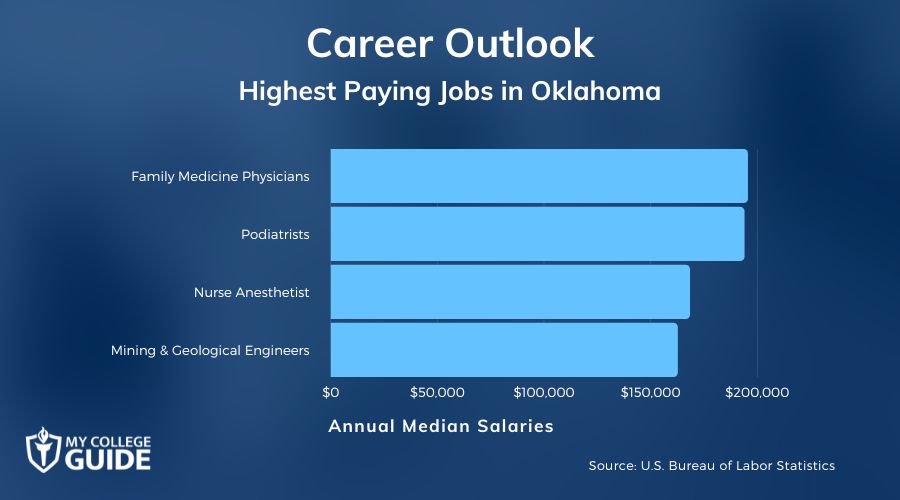
When planning for your future career, it’s natural to look for a role that has high potential earnings. Several of the jobs with the most competitive salaries in Oklahoma are in the medical field.
Editorial Listing ShortCode:
According to the Bureau of Labor Statistics, neurologists have some of the highest earnings with median annual salaries of $233,940. Family medicine physicians are close behind with median earnings of $231,420 per year. The median annual salary for nurse anesthetists in Oklahoma is $169,90, while architectural and engineering managers earn a median salary of $137,530 annually.
List of Online Colleges in Oklahoma
Methodology: The following school list is in alphabetical order. To be included, a college or university must be regionally accredited and offer degree programs online or in a hybrid format.

Cameron University offers distance learning options for students who need flexible school schedules. Many programs are completely online, while others are offered in a hybrid format.
The school offers undergraduate and graduate degree programs. Many courses are asynchronous, but some have scheduled meetings. Fields of study offered include family and child studies, business administration, and organizational leadership.
Cameron University is accredited by the Higher Learning Commission.

East Central University offers several online degree options at undergraduate and graduate levels of studies. Most of these programs are fully online. Online courses are offered in an 8 week, accelerated format, and coursework is completed asynchronously.
Fields of study offered include criminal justice, Native American studies, and library media.
East Central University is accredited by the Higher Learning Commission.

Langston University offers a Bachelor’s in Management with several specialization options that can be earned fully online.
Online classes are taught by the same instructors as their on-campus counterparts. The program requires the completion of 124 credit hours, 12 of which must be from elective courses in the chosen specialization. Specializations offered include Entrepreneurship, Human Resources, Marketing, and Supply Chain Management.
Langston University is accredited by the Higher Learning Commission.

Mid-America Christian University aims to provide students with a quality online education based on Christian principles. The school offers fully online programs for associate, bachelor’s, and master’s degrees. Students may be eligible for life experience and military transfer credits.
Courses are offered in an accelerated format, and students take one course per term. Areas of study offered include cybersecurity and leadership.
Mid-America Christian University is accredited by the Higher Learning Commission.

Steps named Northeastern State University one of the best online colleges. The school offers several fully online programs designed for students with busy schedules. P
rograms are offered for bachelor’s and master’s degrees and professional and graduate certificates. Most programs are asynchronous. Fields of study offered include homeland security and health and sport science.
Northeastern State University is accredited by the Higher Learning Commission.
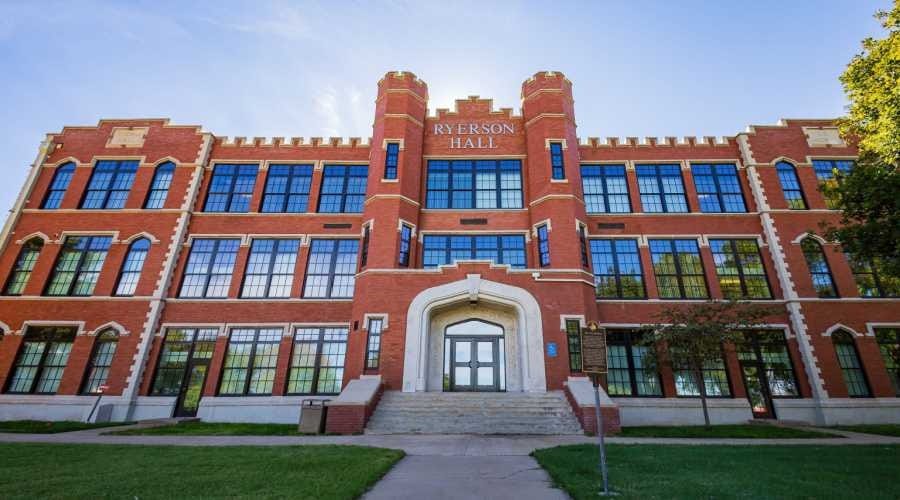
Northwestern Oklahoma State University offers online degree programs designed for working students. The school offers fully online undergraduate and graduate programs in fields such as accounting, business management, and nursing. Some courses have internship requirements. Courses are 8 to 16 weeks long.
Students who already have college credit may opt for NWOSU’s degree completion program.
Northwestern Oklahoma State University is accredited by the Higher Learning Commission.

Oklahoma Baptist University offers a limited number of online programs for working students. Graduate programs are available in a hybrid format with some on-campus courses required.
OBU also offers a Bachelor’s in Christian Studies fully online. Some courses are 8 weeks long, while others follow a traditional semester schedule.
Oklahoma Baptist University is accredited by the Higher Learning Commission.

U.S. News & World Report named Oklahoma City University among the best online colleges. The school currently offers two fully online degrees: an RN-to-BSN and an MSN.
MSN students can choose one of three specializations: Community Health, Education, or Leadership. Courses follow a traditional semester schedule with start dates in the fall, spring, and summer.
Oklahoma City University is accredited by the Higher Learning Commission.

Oklahoma Panhandle State University offers four fully online degree programs. Programs include an AS in Business Administration, a Bachelor’s in Business Administration, a BS in Agribusiness, and an RN-to-BSN.
All courses are offered in an 8 week, accelerated format. There are six start dates offered per year, twice per fall, spring, and summer semesters.
Oklahoma Panhandle State University is accredited by the Higher Learning Commission.

Newsweek named Oklahoma State University in the top 5 online colleges in the country. OSU offers undergraduate and graduate degrees that can be earned in a fully online format. Most courses are asynchronous, 16 weeks long, and have start times in the fall, spring, and summer.
Fields of study offered include early child care and development and digital design.
Oklahoma State University is accredited by the Higher Learning Commission.

Oklahoma Wesleyan University offers fully online associate, bachelor’s, master’s, and doctoral degree programs through its GPS program. Most programs allow students to take one course at a time to help fit their education into their work schedule.
Courses are asynchronous. Areas of study offered include Christian ministry, psychology, strategic leadership, and nursing.
Oklahoma Wesleyan University is accredited by the Higher Learning Commission.

Oral Roberts University educates its residential and online students using a Whole Person method, aiming to give them more than just academics.
ORU offers 20 online undergraduate degree programs and five online master’s degree programs. Additional master’s programs are available in a hybrid format. Terms are 7 weeks long. Fields of study offered include financial management and sports and leisure.
Oral Roberts University is accredited by the Higher Learning Commission.

Rogers State University was among the first in the nation to offer online associate and bachelor’s degree programs.
The school currently offers several undergraduate degrees and one master’s degree that can be earned fully online. Areas of study offered include business administration and environmental studies. Online courses are asynchronous. Those offered in fall and spring are 16 weeks long, while summer courses are 8 weeks long.
Rogers State University is accredited by the Higher Learning Commission.

Southeastern Oklahoma State University offers fully online undergraduate and graduate degree programs designed for students who need flexible school schedules. There are multiple start dates offered each year. Students may pay tuition as they go.
Fields of study offered include Native American leadership, recreation, and occupational safety and health.
Southeastern Oklahoma State University is accredited by the Higher Learning Commission.

Southern Nazarene University offers online and hybrid programs designed for working adults. SNU has a generous transfer policy and allows up to 30 credits for qualifying life experiences. There are multiple start dates offered each year. Most courses are attended in an asynchronous, accelerated format.
The school offers associate, bachelor’s, master’s, and doctoral degrees in fields like management and teaching.
Southern Nazarene University is accredited by the Higher Learning Commission.

Southwestern Christian University offers degrees that can be earned through online or evening classes. Online students don’t have to come to campus, even for exams.
SCU offers six bachelor’s degree programs in fields such as Christian leadership, liberal studies, and human services. There are multiple start dates offered each year, and courses are conducted in an accelerated format.
Southwestern Christian University is accredited by the Higher Learning Commission.

Southwestern Oklahoma State University offers several distance learning options for earning a degree. Many programs are available fully online with asynchronous coursework. Others have synchronous meetings over Zoom or are offered in a blended format.
SOSU offers undergraduate and graduate degrees in fields such as health information management and reading specialist.
Southwestern Oklahoma State University is accredited by the Higher Learning Commission.

Newsweek named the University of Central Oklahoma among the top online colleges. The school offers fully online degree programs designed for busy students.
Students may be able to earn credit for life experiences. Most courses are asynchronous, and many are offered in an 8 week format. The school offers undergraduate and graduate programs in fields such as finance and library media education.
The University of Central Oklahoma is accredited by the Higher Learning Commission.

Online Colleges ranked the University of Oklahoma as the #1 online college in Oklahoma. The school offers over 30 graduate programs designed for working adults. Many of these programs are available fully online, while others require time on campus. There are start dates offered in the fall, spring, and summer. Fields of study offered include hydrology and water security and healthcare law.
The University of Oklahoma is accredited by the Higher Learning Commission.
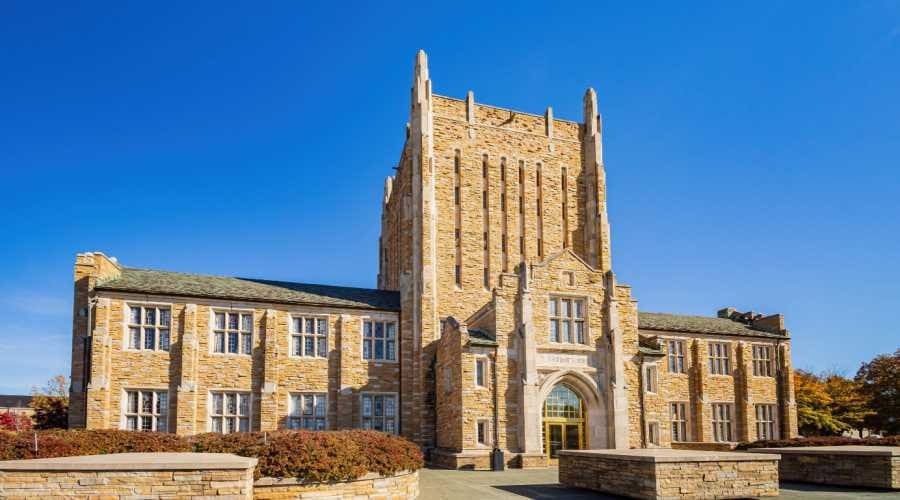
The University of Tulsa currently offers two degrees that can be earned fully online: a Master’s in Business Administration and an MS in Cyber Security. Classes in these programs may be taken full-time or part-time. There are start dates offered in the fall, spring, and summer, and courses follow a traditional semester schedule.
Both programs require GRE scores or a waiver to apply.
The University of Tulsa is accredited by the Higher Learning Commission.
Getting Your Online Degree in Oklahoma

With excellent colleges and universities, a wealth of online learning opportunities, and generous financial aid programs, it’s clear that Oklahoma has a lot to offer students.
When you’re ready to start the next step in your journey, you can research accredited Oklahoma online colleges that offer your chosen degree program.
You can also view our Online Colleges in Ohio and Online Colleges in Oregon guides for more options.
